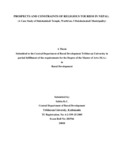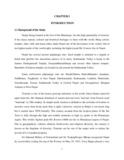Please use this identifier to cite or link to this item:
https://elibrary.tucl.edu.np/handle/123456789/2238| Title: | Prospects and Constraints of Religious Tourism in Nepal: (A Case Study of Dakshainkali Temple, Ward No. 5 Dakshainakali Municipality) |
| Authors: | K. C., Sabita |
| Keywords: | Religions;Economic Impact;Environmental Impact;Tourism |
| Issue Date: | 2018 |
| Publisher: | Central Department of Rural Development |
| Abstract: | The present study PROSPECTS AND CONSTRAINTS OF RELIGIONS IN NEPAL: A Case Study of Dakshainkali Temple, Ward no. 5 Dakshainakali Municipality also a remote village. The specific objectives of to analyze the level of infrastructure development in Dakshainlali,to compare social, economic and environmental impact of religious tourism andto explore the challenges of tourism development in the study area. The selection of the study area is one of the critical issues while undertaking a research work. Considering the common base in site selection Dakshainkali Temple is selected to cover the reflection of the maximum area of Kathmandu district as a place of attraction for the village tourism in the field of ecotourism, cultural tourism, rural tourism, agro-tourism and religious tourism. Because of poverty, they are finding hardship to maintain hand to mouth problem. Before this study there are no any studies in this subject which shows actual situation of possibilities of village tourism. Both primary and secondary data have been collected for the purpose of study. Therefore: Primary data are based on survey, observation, questionnaire, interviews, focus group discussions and case study. Both published and unpublished documents, books and relevant materials related to the subject matter have been incorporated as secondary data. However secondary data were derived or collected from different authorizes sources that are given below. Dakshainkali Municipality profile, Kathmandu DDC profile, CBS report, Newspaper, magazine and Internet search. The select area of the Dakshainkali Temple were the universe of the study. The village tourism from overall perspective so, randomly selected from above mentioned village Moreover, due attention was paid for sample size. Fifty households of respondents will be selected for the study until in simple random basis. Focus group discussion will be on entrepreneurs of small hotels and in local restaurant. |
| URI: | http://elibrary.tucl.edu.np/handle/123456789/2238 |
| Appears in Collections: | Rural Development |
Files in This Item:
| File | Description | Size | Format | |
|---|---|---|---|---|
| Cover Page(5).pdf | 118.8 kB | Adobe PDF |  View/Open | |
| CHAPTER I (4).pdf | 991.7 kB | Adobe PDF |  View/Open |
Items in DSpace are protected by copyright, with all rights reserved, unless otherwise indicated.
